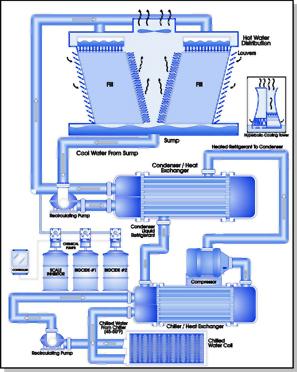|
Cooling Water Problems
Scaling || Corrosion || Fouling || Microbial
Click
on this image
to view a full-screen graphic
 Scaling Scaling
Water formed deposits result from naturally occurring
minerals precipitating from water to form scale. The
most common scales are calcium carbonate, calcium
sulfate and silica or silicates. Scale buildup on
surfaces can be extremely hard and difficult to
remove. Scaling will drastically reduce heat transfer
capacity and system energy efficiency.
Corrosion
Cooling systems are exposed to many types of
corrosion, from general electrochemical corrosion,
to pitting caused by deposits, electrolysis, or
microorganisms. Corrosion can reduce the life-span
of equipment by years, requiring expensive
replacement. It can lead to costly equipment repairs
and production downtime. Corrosion related deposits
lead to reduced capacity and wasted energy because
of heat transfer efficiency losses.
Fouling
Fouling occurs when solid materials form or
contribute to the formation of deposits on equipment
surfaces. They are introduced to the system as
suspended solids and may enter by the makeup water,
from corrosion by products, or as airborne
materials. Examples include mud, sand, silt, clay,
oils, debris, organics, microbes, etc. These
materials adhere to heat transfer surfaces and
reduce heat transfer and water flow.
Microbial
Microbial problems associated with industrial
cooling water systems are caused by algae, fungi,
and bacteria. They cause plugging, fouling,
corrosion, and destruction of wooden cooling tower
components. Many different bacteria species may
exist in cooling water systems. Some of the problems
caused include severe bacterial slimes and fouling,
sulfuric acid, underdeposit corrosion and health
hazards.
HOME || About AmSolv
|| Contact Us
AmSolv
Products
|| AmSolv
Standard Products
|| Water
Problems
|


 Scaling
Scaling